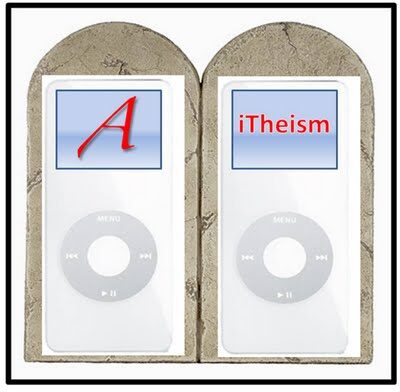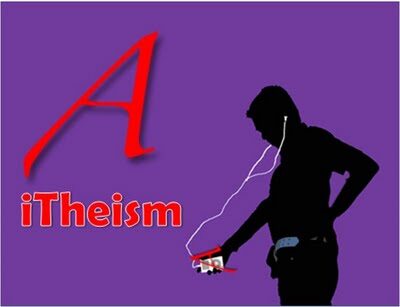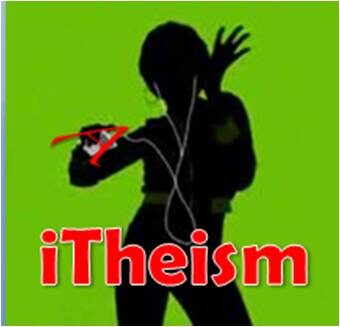What is the problem with the self made man? That he worships his creator (man here meaning non-gender specific personage).
I have often noted that atheism, or many atheists, do not seek to be rid of God but merely replace a supernatural God with a natural one.
Indeed, two of atheism’s consoling delusions are the delusion of absolute autonomy and lack of ultimate accountability.
God states, “You shall have no other gods before me.”
The atheist states, “I shall have no other gods before me” or “I shall have no other gods besides me.”
Let us consider the concept of iTheism, then the history of iTheism and then specific examples of iTheists.

Atheism is thus premised upon the original of original sins: iTheism. This denotes placing oneself on the ultimate pedestal; there may be people who are more knowledgeable than we or more capable in this or that way but ultimately we, the iTheists, are the supreme authority. The iTheist determines what is right/good/moral and wrong/evil/immoral, what is true and false, the iTheist sees god reflected in their mirror.
The original, original sin was committed by lucifer, who was not an atheist, and became satan when he became an iTheist. As it is elucidated in Isaiah ch. 14:
How you are fallen from heaven, O Lucifer, son of the morning! How you are cut down to the ground, you who weakened the nations! For you have said in your heart: “I will ascend into heaven, I will exalt my throne above the stars of God; I will also sit on the mount of the congregation on the farthest sides of the north; I will ascend above the heights of the clouds,
I will be like the Most High.”
From this premise, known as the five I wills, satan has not had one single new idea and why bother as this one has worked wonders as he waters the seed of rebellion within the heart of humanity.
In Genesis 3:1-5 it states that satan, referred to in the text as “the serpent,” (also see Revelation 12:9, 20:2) told Eve:
“Has God indeed said, ‘You shall not eat of every tree of the garden’?” And the woman said to the serpent, “We may eat the fruit of the trees of the garden; but of the fruit of the tree which is in the midst of the garden, God has said, ‘You shall not eat it, nor shall you touch it, lest you die.’”
Then the serpent said to the woman, “You will not surely die. For God knows that in the day you eat of it your eyes will be opened, and you will be like God, knowing good and evil.”
Note the steps 1) question God’s statements, 2) contradict God’s statements and 3) urge rebellion in seeking equality with God.
In atheism of the iTheism sort this works out thusly: 1) question that there is a God to make a statement in the first place and therefore fulfill questioning God’s statements, 2) even though there is no God to make a statement, contradict those statements claimed to have been spoken by God (′cause you, in your unfathomably finite wisdom, know better) and 3) become equal with God, meaning to make yourself God and thus, replace God with you the iTheist and urging others to do likewise—especially the naturally rebellious and overactive libidoed youth.
This pattern repeats throughout history until the very end when,
the son of perdition, who opposes and exalts himself above all that is called God or that is worshiped, so that he sits as God in the temple of God, showing himself that he is God (2nd Thessalonians 2:3-4).
Now, consider a statement made by Dan Barker of the Freedom From Religion Foundation (which was established in the USA, a country premised upon the concept of freedom of religious expression) :
The United States of America, for example, is a proudly rebellious nation. We fought a Revolutionary War kicking out the king, dictator, lord. There is value in not bowing to traditions that imply subservience to a Master–we are not slaves. Yet most religious language suggests the opposite: we must worship that which is above us and adore or obey the Father/Mother/Creator who guides our lives. [emphasis in original]
What was the straw that broke the iTheistic camel’s back: the concept of god as God as the king, dictator, lord and Master because we are not slaves and must kicking God out. Since most religious language suggests the opposite he rejects it because, being an iTheist, he cannot conceive of, or allow anyone/thing, above him which he must/should/would want to worship, adore and obey.
Of course, as I noted in my essay The Totalitarian, Dictatorial, Tyrannical Worldview iTheists actually do not escape anything when they reject God but merely jump from the freeing pan and into the fire.

Larry Taunton interviewed Richard Dawkins: The Atheist Evangelist and wrote the following:
“You’re not telling me that as a civilized 21st-century man that you get your morality from the Ten Commandments?” He was incredulous. To him, it was as if I were saying, “The Easter Bunny gave us these laws, and they fall into three categories … .”
“What aspects of the Ten Commandments do you find objectionable?” I asked.
After an animated exchange and a brief search for a Bible, Dawkins went straight to the opening line of the Decalogue: “Thou shalt have no other gods before me.” The idea of a personal God who demands exclusivity of worship offended him. Given Dawkins’s worldview, this seemed like a logical protest. After all, the other nine commandments hang on that one.
Do you see the point? Anything and everything that is premised upon “Thou shalt have no other gods before me” is instantly and ad hominemly rejected because, as an iTheist, Dawkins cannot allow any gods before or beside he, himself.
What Richard Dawkins does not seem to consider is that without premise “Thou shalt have no other gods before me” the commandments which follow would be about as authoritative, alive, potent and enjoining as Dawkins’ very own New Ten Commandments (of which he lists 15 see here for Dawins’ and here for Christopher Hitchens’). Which is to say that they would be yet another mere list of moral assertions promulgated by a temporary bio-organism who formulated them upon bio-chemical reactions in its brain as it lives on a pale blue dot in the universe’s backwaters.
This is clearly not about ritualistic, dietary and otherwise behavioral laws in general; this is about the iTheist not wanting God to get in the way of their self worship.
Again I turn to Friedrich Nietzsche who understood that the death of God would lead to the deification of man as we shrug off the celestial monarch and replace Him with terrestrial monarchs. In his Parable of the Mad Man he states that after murdering God the question is posed, “Must we ourselves not become gods…?” in that we would concoct, by necessity iTheistic, “festivals of atonement…what sacred games shall we have to invent?”

As for satan, the text continues:
Yet you shall be brought down to Sheol, to the lowest depths of the Pit.
Those who see you will gaze at you, and consider you, saying:“Is this the man who made the earth tremble, who shook kingdoms, who made the world as a wilderness and destroyed its cities, who did not open the house of his prisoners?”
All the kings of the nations, all of them, sleep in glory, everyone in his own house; but you are cast out of your grave like an abominable branch, like the garment of those who are slain, thrust through with a sword, who go down to the stones of the pit, like a corpse trodden underfoot.
Cast off your crowns my dear iTheists, repent and cast them at the feet of the true King, Jesus the Messiah, who said,
Behold, I stand at the door and knock.
If anyone hears My voice and opens the door, I will come in to him and dine with him, and he with Me (Revelation 3:20).”
